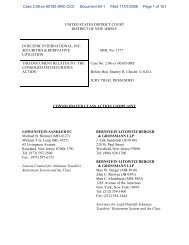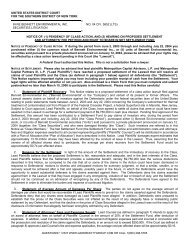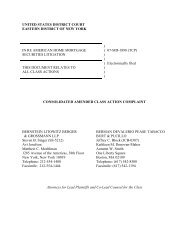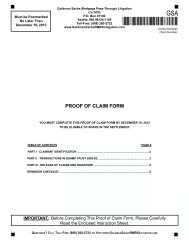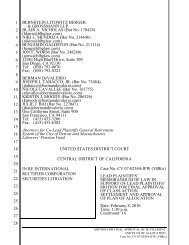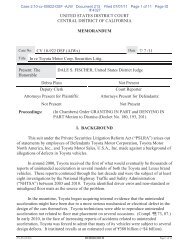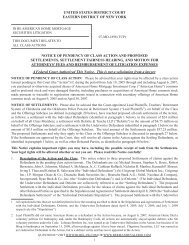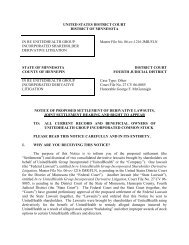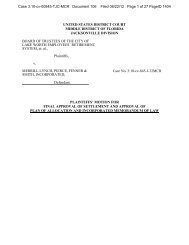dcivil rights movement. But on <strong>the</strong> whole, <strong>the</strong> DemocraticParty led <strong>the</strong> charge for civil rights and had begun <strong>to</strong> doso with Roosevelt and Truman. And <strong>the</strong> Republicans werefighting <strong>the</strong> rear guard.LD: Why did you care?DB: When my family left Illinois, before we moved <strong>to</strong>Fuller<strong>to</strong>n, which is a fairly nice Orange County suburb, wemoved <strong>to</strong> Comp<strong>to</strong>n. And I went <strong>to</strong> junior high school inComp<strong>to</strong>n, California. That was a sea change.LD: Were you in shock wondering what happened or didyou embrace it?DB: I embraced it. It was interesting. It was different.Comp<strong>to</strong>n at that point was a very racially integrated <strong>to</strong>wn and<strong>the</strong> relationships between races were not always smooth.But <strong>the</strong>re were things you learned when you grow up with“What I have <strong>to</strong> do is change people’sminds. You very rarely change people’sminds yelling at <strong>the</strong>m. … You have <strong>to</strong>talk <strong>to</strong> <strong>the</strong>m. That’s one of <strong>the</strong> thingsI do, I talk <strong>to</strong> <strong>the</strong> jurors.”people I think of any race, or any group of human beings.You realize how much <strong>the</strong>y are like you and you are like<strong>the</strong>m. And how really insignificant <strong>the</strong> differences are.dAnd<strong>the</strong>n you grow up playing, going <strong>to</strong> school with, fightingAfrican-Americans, you just naturally accept <strong>the</strong>ir equality.LD: Were <strong>the</strong>re any specific instances that led <strong>to</strong> your awakeningon <strong>the</strong> issue of civil rights?DB: Sometimes things happen that you remember extremelywell years later. I was on <strong>the</strong> debate team and we had adebate <strong>to</strong>urnament. We drove 20,000 miles debating intwo years, almost all of it by car. And at <strong>the</strong> school <strong>the</strong>rewere all races. And everyone was integrated, I don’t thinkanyone felt discriminated against. It was California, thingswere different.And we were driving back from a debate <strong>to</strong>urnament inAlbuquerque, New Mexico. And we s<strong>to</strong>pped <strong>to</strong> get something<strong>to</strong> eat in Arizona on old Route 66. And this café, wewere walking up and <strong>the</strong>y had in <strong>the</strong> window <strong>the</strong>se red,white and blue posters ex<strong>to</strong>lling <strong>the</strong> spirit of ‘76, warningabout <strong>the</strong> dangers of international Communism, and <strong>the</strong>nyou come <strong>to</strong> <strong>the</strong> door and over <strong>the</strong> door <strong>the</strong>re’s a woodensign that says “No colored trade solicited.”LD: That must have come as a shock <strong>to</strong> you after your yearsin California.DB: I knew that in <strong>the</strong> South things were still segregated,<strong>the</strong>re was racial tension and racial discrimination. But Ialways associated that with <strong>the</strong> South. I didn’t associatethat with <strong>the</strong> West. That was in <strong>the</strong> spring of 1962. And<strong>the</strong>n that fall, I left <strong>to</strong> go <strong>to</strong> law school. I started law schoolat Northwestern.I drove my wife and two children from Redlands <strong>to</strong> Chicagonons<strong>to</strong>p because we didn’t have enough money for ahotel room. And by <strong>the</strong> time we got <strong>to</strong> Chicago, we werea little disheveled. One of <strong>the</strong> professors who had inter<strong>view</strong>edme had arranged an apartment for me <strong>to</strong> rent at <strong>the</strong>Old Towns Gardens. So I went <strong>to</strong> <strong>the</strong> rental office, <strong>to</strong> sign<strong>the</strong> papers, and Caryl stayed in <strong>the</strong> car with <strong>the</strong> childrenbecause A, she didn’t want <strong>to</strong> wake <strong>the</strong> children, and B, shedidn’t feel she looked all that presentable after 40 hours in<strong>the</strong> car.So I went in and said I was <strong>the</strong>refor <strong>the</strong> apartment. And <strong>the</strong> rentalagent starts <strong>to</strong> talk and talk, asksif my wife is OK, I say, “She’s fine,she’s with <strong>the</strong> children.” They ask ifshe would like <strong>to</strong> come in for a cupof coffee. And it went on like thatfor eight or 10 minutes. “Wouldyou like me <strong>to</strong> go out and see howshe is?”And, you know, I’m thinkingI just need <strong>to</strong> get my kids <strong>to</strong> bed.So finally, she says, “I hate <strong>to</strong> have<strong>to</strong> ask this, and if it was just me Iwouldn’t ask, but I have <strong>to</strong> ask is your wife colored?”And I said, “Why do you ask?” And she said, “I reallyneed <strong>to</strong> ask.” And I said, “Does that mean if she is coloredwe can’t rent <strong>the</strong> apartment?” She replied, “I really need <strong>to</strong>ask if she’s colored or not.”You sort of think about all sorts of responses, whe<strong>the</strong>ryou want <strong>to</strong> stand on principle. I had two small childrenand a very tired wife, so I said, “No she’s not,” and <strong>the</strong>y gaveme <strong>the</strong> apartment.That in combination with what had happened in <strong>the</strong>spring in New Mexico really got me thinking. This wasn’teven Arizona, this was in Illinois. I’d grown up in Illinois,<strong>the</strong> Land of Lincoln. I didn’t expect <strong>to</strong> find that. Now, onceyou learn more about <strong>the</strong> world you expect <strong>to</strong> find <strong>the</strong>sethings. But in those days I was naïve enough <strong>to</strong> think thatkind of racism was limited <strong>to</strong> particular parts of America.I began <strong>to</strong> get active in <strong>the</strong> civil rights movement when Iwas at Northwestern and continued at Yale. By <strong>the</strong> time Iwent down <strong>to</strong> Mississippi later in <strong>the</strong> ‘60s, I just didn’t feelcomfortable in <strong>the</strong> Republican Party.LD: During those years, <strong>the</strong>re was an in teresting transformationin <strong>the</strong> <strong>view</strong> of <strong>the</strong> role of law. I’m curious <strong>to</strong> hearabout <strong>the</strong> development of your belief that you could use <strong>the</strong>law as a <strong>to</strong>ol <strong>to</strong> bring about social change and better yourL A W D R A G O N 196 I s s u e 13
life. It sounds like that <strong>view</strong> – and your career – is veryfirmly rooted in <strong>the</strong> civil rights movement.DB: It was a <strong>to</strong>ol. It was something <strong>to</strong> use. Years ago someonewas writing about me and managed <strong>to</strong> go back and get<strong>the</strong> Yale Law School <strong>to</strong> look at a copy of my application, and<strong>the</strong>re was a question why I wanted <strong>to</strong> go <strong>to</strong> Yale LawSchool. And I said I want <strong>to</strong> go <strong>to</strong> law school because I want<strong>to</strong> be a lawyer and I can’t be a lawyer unless I go <strong>to</strong> lawschool. And I want <strong>to</strong> be a lawyer because law is <strong>the</strong> wayyou we change society. Law determines who you can marry,where you can live, what kind of jobs you can do. If youwant <strong>to</strong> make changes <strong>the</strong>re, you’ve got <strong>to</strong> be a lawyer.I’ve always believed that one of <strong>the</strong> great things about beinga lawyer is you have an opportunity <strong>to</strong> really make avery comfortable living. At <strong>the</strong> same time, it allows you <strong>to</strong>make a real contribution <strong>to</strong> society and really make change.The opportunity is <strong>the</strong>re.LD: Do you think that was a new perspective starting in <strong>the</strong>‘60s or it became more heightened?DB: It’s become more heightened. There were always peoplewho had that <strong>view</strong>, but I think it became more heightened.When I was growing up in <strong>the</strong> ‘50s, Perry Mason was a lawyer.You weren’t doing social engineering. By <strong>the</strong> time I go<strong>to</strong>ut of law school I was very much committed <strong>to</strong> using <strong>the</strong>law, and it’s proven <strong>to</strong> be a very powerful <strong>to</strong>ol.There were a lot of failures on <strong>the</strong> way, but civil rightscould not have succeeded without law, without lawyers and<strong>the</strong> courts. In 1986, I sued <strong>the</strong> Republican National Committeeon behalf of <strong>the</strong> DNC and got a permanent injunctionagainst <strong>the</strong> RNC targeting minorities. Those thingsmake a difference.LD: You’ve done so much for a kid from Marengo becauseof your ability <strong>to</strong> understand <strong>the</strong> law and use it <strong>to</strong> shapechange in <strong>the</strong> lives of people. Think of this: Gay marriagewill be legal in our lifetime – and is now in a lot of places.And that is directly because of your willingness <strong>to</strong> challenge<strong>the</strong> government when appropriate and defend it whenthat’s appropriate. You have created a broader definition ofwhat it is <strong>the</strong> law is intended <strong>to</strong> do.DB: I think that’s right. It’s very rewarding <strong>to</strong> see <strong>the</strong>lives of people that are changed. Sometimes like <strong>the</strong>Prop. 8 case, and <strong>the</strong> work in Mississippi, you see a realhuman face. Sometimes like with <strong>the</strong> injunction, youdon’t see <strong>the</strong> effect on an individual, but you see <strong>the</strong> ability<strong>to</strong> preserve fairness in <strong>the</strong> election process. Sometimeslike in <strong>the</strong> case where we’re suing <strong>the</strong> government onbehalf of Starr International, a landmark case on behalfof Starr as a shareholder of AIG claiming <strong>the</strong> governmentwrongfully <strong>to</strong>ok over <strong>the</strong> company during <strong>the</strong>financial crisis, what we’re really saying is <strong>the</strong> governmentis not above <strong>the</strong> law. That is a proposition thatwhile you don’t see a human face immediately, it affects<strong>the</strong> relationship of <strong>the</strong> government <strong>to</strong> all citizens. And itsays every single citizen has <strong>the</strong> legal right <strong>to</strong> protect<strong>the</strong>ir property. And no matter how well meaning, <strong>the</strong>government can’t go around that.In <strong>the</strong> Westmoreland case, we defended Mike Wallaceand CBS against a libel claim from General Westmorelandwho, <strong>the</strong>ir reporting showed, had not accurately reported<strong>the</strong> situation in Vietnam in order <strong>to</strong> maintain public supportfor <strong>the</strong> war. That was a case at <strong>the</strong> time it was broughtthat if you go back and look at <strong>the</strong> attacks on <strong>the</strong> media,<strong>the</strong> Accuracy in Media group had drawn a huge map on <strong>the</strong>media and funded all <strong>the</strong>se lawsuits, libel lawsuits. And itall s<strong>to</strong>pped after we won <strong>the</strong> Westmoreland case.LD: That’s similar <strong>to</strong> what we’ve seen with gay marriage.DB: Well, a lawsuit can do that. It can pull something out,expose it. And it requires people <strong>to</strong> get up on <strong>the</strong> witnessstand and be cross examined, calls <strong>the</strong>m <strong>to</strong> account. LikeDavid Blankenhorn, who was <strong>the</strong> only witness in support ofProp. 8, yet he couldn’t even say what <strong>the</strong> harm was ofallowing gay couples <strong>to</strong> marry. Did you read his op-ed in<strong>the</strong> New York Times? He wrote about now he supports gaymarriage and <strong>the</strong> good it can do.LD: After you destroyed him on cross-examination.DB: And that is a transformation. And it is going <strong>to</strong> effectpeople. The more people come out like that, <strong>the</strong> more o<strong>the</strong>rpeople begin <strong>to</strong> rethink <strong>the</strong>ir positions.LD: Hopefully <strong>the</strong>re will be far fewer instances of people askingif <strong>the</strong>re’s a man or woman waiting for you in <strong>the</strong> car.DB: That’s right. What’s <strong>the</strong> sex, what’s <strong>the</strong> race, what’s <strong>the</strong>religion? All <strong>the</strong> kind of things that distinguish humanbeings, which do not effect or limit <strong>the</strong>ir humanity.LD: One of <strong>the</strong> things that’s so <strong>to</strong>uching about you and yourapproach <strong>to</strong> <strong>the</strong> law: You always at <strong>the</strong> end of <strong>the</strong> day saylets bring this <strong>to</strong> court, put aside <strong>the</strong> craziness and let’s talkabout what this is really about.DB: That’s absolutely right. Particularly in <strong>the</strong> kind of casesthat I bring. If I were a screamer kind of guy, it would bevery hard <strong>to</strong> do what I have <strong>to</strong> do. What I have <strong>to</strong> do ischange people’s minds. You very rarely change people’sminds yelling at <strong>the</strong>m. You can excite your base by yelling.But you can’t change people’s minds. To change people’sminds, you have <strong>to</strong> talk <strong>to</strong> <strong>the</strong>m. That’s one of <strong>the</strong> things Ido, I talk <strong>to</strong> <strong>the</strong> jurors.Adlai Stevenson, when he was running for president,said he was going <strong>to</strong> talk sense <strong>to</strong> <strong>the</strong> American people.That didn’t work probably because he was against <strong>the</strong> mostpopular person in <strong>the</strong> country, but that has always beenmy goal: <strong>to</strong> talk sense <strong>to</strong> whoever you’re talking <strong>to</strong>. Andwhat you find is if you trust people., a remarkable numberof <strong>the</strong>m actually respond <strong>to</strong> you. People actually like <strong>to</strong> betreated like thinking adults, even people who start off veryantagonistic, you talk sense <strong>to</strong> <strong>the</strong>m. You can slowly – notalways, it’s not perfect, it’s a process, but one that succeedsremarkably often.LD: So much has been made of your command of workingwith judges and o<strong>the</strong>r lawyers. I remember talking <strong>to</strong> MaryI s s u e 13 197 l a w d r a g o n . c o m
- Page 6:
One of the nation’s premierplaint
- Page 9 and 10:
LAWDRAGON HONORS...Boies, Schiller
- Page 12 and 13:
Robinson Calcagnie RobinsonShapiro
- Page 14 and 15:
ProvidingSolutionsSher Garner Cahil
- Page 17 and 18:
Lawdragon 500 LEADING LAWYERSRob Ad
- Page 19 and 20:
Each win is important because every
- Page 21 and 22:
It takes a lot of fire to beselecte
- Page 23 and 24:
WhenExperienceCountsENGSTROM LIPSCO
- Page 25 and 26:
A law firm featuring trial lawyersp
- Page 27 and 28:
When the situation gets intense, so
- Page 29 and 30:
Trustedadvocacy.Provenresults.Max B
- Page 31 and 32:
&ProspectorEntrepreneurThe New IP L
- Page 33 and 34:
“I started thinking that there’
- Page 35 and 36:
James W. GiddensTrustee of Lehman B
- Page 37 and 38:
Tom AjamieLawdragon 500The largest
- Page 39 and 40:
Gallagher & KennedyP.A.Law OfficesW
- Page 41 and 42:
Well done isbetter thanwell said.-B
- Page 43 and 44:
I s s u e 13 37 l a w d r a g o n .
- Page 45 and 46:
of Sarajevo that lasted from 1992 t
- Page 47 and 48:
unsuccessfully sought refuge. (In 2
- Page 49 and 50:
perceived biases in predominantly t
- Page 51 and 52:
Vukcevic said the biggest threat ca
- Page 53 and 54:
“ T h e v e r y f a c t t h a t a
- Page 55 and 56:
eport, and he filed a slander suit
- Page 57 and 58:
implementation. An impressive effor
- Page 59 and 60:
Lawdragon.com is a fast-growing new
- Page 62 and 63:
Ted MirvisWachtell Lipton (New York
- Page 64 and 65:
Larry SonsiniWilson Sonsini (Palo A
- Page 66 and 67:
500Lawdragon Q & A with:Kim AskewKi
- Page 68 and 69:
Paul ClementBancroft (Washington, d
- Page 70 and 71:
Lyle GanskeJones Day (cleveland)nam
- Page 72 and 73:
Charles “Casey” CogutSimpson Th
- Page 74 and 75:
500Roy Barnes Barnes Law Group (Mar
- Page 76 and 77:
Ed HerlihyWachtell Lipton (New York
- Page 78 and 79:
500Lawdragon Q & A with:Ethan Kling
- Page 80 and 81:
500500Martha Bergmark Mississippi C
- Page 82 and 83:
Kathy PatrickGibBs & Bruns (Houston
- Page 84 and 85:
500Lawdragon Q & A with:Gerald Shar
- Page 86 and 87:
500500Frank Branson Law Office of F
- Page 88 and 89:
Reed BrodskyU.S. Department of Just
- Page 90 and 91:
500Lawdragon Q & A with:Gregory mAr
- Page 92 and 93:
500Paul Clement Bancroft (Washingto
- Page 94 and 95:
Kenneth ReillyShook Hardy (Miami)
- Page 96 and 97:
Jennifer KellerKeller Rackauckas (I
- Page 98 and 99:
500500Thomas Demetrio Corboy & Deme
- Page 100 and 101:
Shanin SpecterKline & Specter (Phil
- Page 102 and 103:
500Lawdragon Q & A with:Nancy Abell
- Page 104 and 105:
500500Howard Ellin Skadden (New Yor
- Page 106 and 107:
Mary CranstonPillsbury (San Francis
- Page 108 and 109:
Steve BermanHagens Berman (Seattle
- Page 110 and 111:
500Paul Geller Robbins Geller (Boca
- Page 112 and 113:
Pat McGroderGallagher & Kennedy (Ph
- Page 114 and 115:
Steven MoloMoloLamken (New York)
- Page 116 and 117:
500Lawdragon Q & A with:Jonathan St
- Page 118 and 119:
Max BergerBernstein Litowitz (New Y
- Page 120 and 121:
500John Halvey NYse (New York) The
- Page 122 and 123:
Greg WilliamsRichards Layton (Wilmi
- Page 124 and 125:
Robin CohenKasowitz Benson (New YOr
- Page 126 and 127:
500Lawdragon Q & A with:ed mossAlth
- Page 128 and 129:
500500Mel Immergut Milbank (New Yor
- Page 130 and 131:
500Lawdragon Q & A with:NicHolas Gr
- Page 132 and 133:
Beth WilkinsonPaul Weiss (Washingto
- Page 134 and 135:
500500Jeffrey Kessler Winston & Str
- Page 136 and 137:
Daniel NeffWachtell Lipton (New Yor
- Page 138 and 139:
Bill OhlemeyerBoies Schiller (New Y
- Page 140 and 141:
500William Lee WilmerHale (Boston)
- Page 142 and 143:
500Lawdragon Q & A with:Mel Immergu
- Page 144 and 145:
Greg CraigSkadden (Washington, dc)
- Page 146 and 147:
Paul SingermanBerger Singerman (Mia
- Page 148 and 149:
Kathleen Flynn PetersonRobins Kapla
- Page 150 and 151:
500William McLucas WilmerHale (Wash
- Page 152 and 153: Brian RiopelleMcGuireWoods (Richmon
- Page 154 and 155: 500Lawdragon Q & A with:Brian Pastu
- Page 156 and 157: 500500Patrick Naughton Simpson Thac
- Page 158 and 159: Kelli SagerDavis Wright (Los Angele
- Page 160 and 161: Aaron PodhurstPodhurst Orseck (Miam
- Page 162 and 163: 500500Roberta Pichini Feldman Sheph
- Page 164 and 165: 500Lawdragon Q & A with:James Gidde
- Page 166 and 167: Linda AddisonFulbright & Jaworski (
- Page 168 and 169: 500Lawdragon Q & A with:Victor Sher
- Page 170 and 171: 500Maritza Ryan U.S. Military Acade
- Page 172 and 173: Neil ManneSusman Godfrey (Houston)
- Page 174 and 175: 500Gerald Shargel Law Offices of Ge
- Page 176 and 177: 500500Joe Sims Jones Day (Washingto
- Page 178 and 179: 500Lawdragon Q & A with:Perrie Wein
- Page 180 and 181: 500500Sri Srinivasan Office Of U.S.
- Page 182 and 183: Stephen HermanHerman Herman (New Or
- Page 184 and 185: 500Clarence Thomas U.S. Supreme Cou
- Page 186 and 187: 500Lawdragon Q & A with:Kenneth eCK
- Page 188 and 189: Andrew MichaelsonBoies Schiller (Ne
- Page 190 and 191: Wayne OuttenOutten & golden (New Yo
- Page 192 and 193: 500Laura Wasser Wasser Cooperman &
- Page 194 and 195: 500Theodore Wells Paul Weiss (New Y
- Page 196 and 197: Peter BicksOrrick (New York)
- Page 198 and 199: Terry O’ReillyO’Reilly Collins
- Page 200 and 201: -you are cordially invited toCockta
- Page 204 and 205: in the hallway during the McCourt d
- Page 206 and 207: KELLER RACKAUCKAS LLPKay Rackauckas



